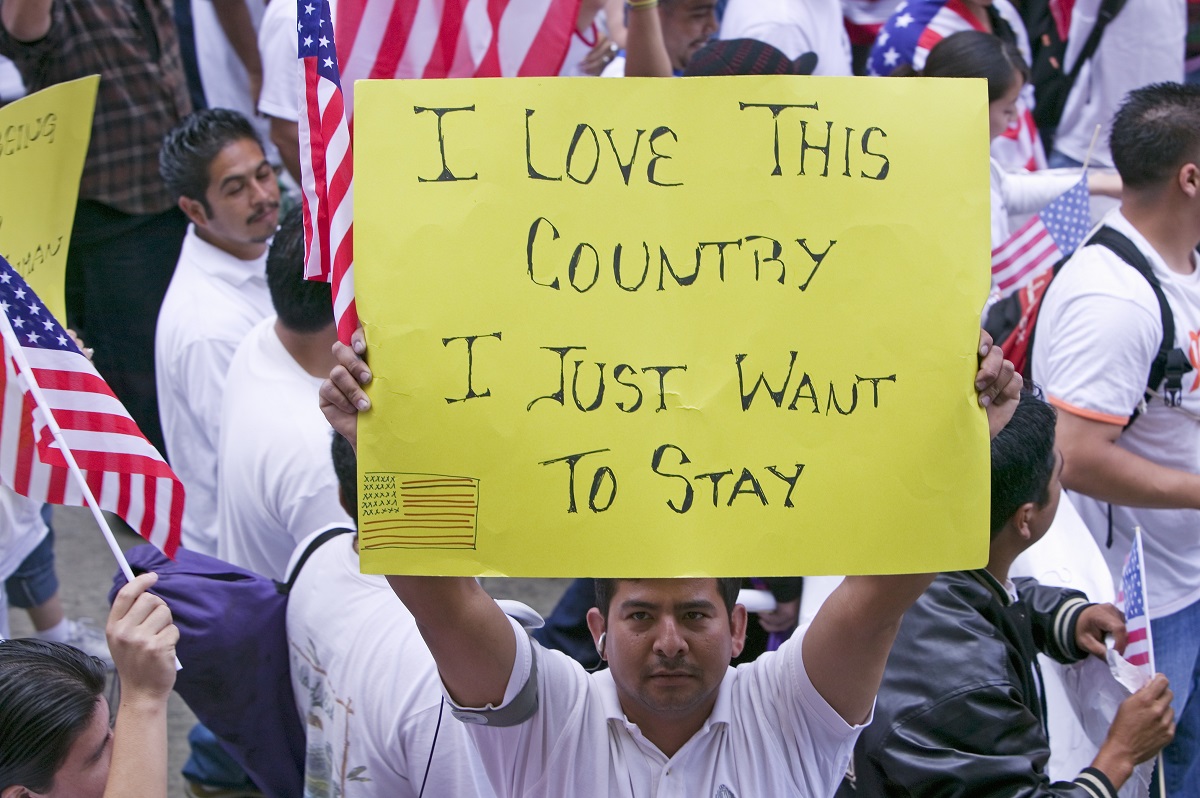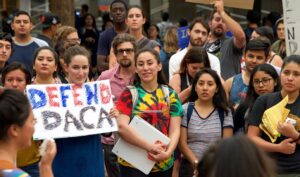
For undocumented immigrants in the United States, life can be difficult. The stakes are high. Getting caught means a likely removal (deportation) from the United States. But it also may break apart a family, disrupt the family’s finances, and result in stiffer immigration penalties. Currently, there is no extensive amnesty program like President Reagan introduced in 1986, but there are a variety of laws and smaller programs that offer paths to legal status for certain undocumented immigrants. Although not everyone will qualify for these paths, they are worth learning about.
Undocumented Explained
In this article, the term “undocumented” immigrant is used to describe an immigrant without any legal immigration status. No status maybe the result of entering the United States without inspection or entering via a valid nonimmigrant visa (e.g. tourist visa, student visa) that has since expired. The term “entered without inspection” or EWI is used to specifically describe someone that has come across the border and never interacted with a U.S. border agent.
Although there are approximately 650,000 childhood arrivals protected by the DACA program, this is not a lawful immigration status. It is a temporary solution and provides extremely limited opportunities for beneficiaries. DACA recipients need paths to legal status like any other undocumented individual.
For undocumented immigrants, the clear goal is a path to a long-term lawful immigration status. These paths to legal status lead to permanent residence (green card) and U.S. citizenship. This article covers those options and who could qualify for them.
Permanent Residence (Green Card) through Marriage
One of the most common questions, and most common paths to legal status, is the treatment of an undocumented immigrant when he or she marries a U.S. citizen or lawful permanent resident.
The foreign spouse of a U.S. citizen qualifies as an immediate relative. For the immediate relatives of a U.S. citizen, obtaining a green card may be a fairly straight forward process. In fact, a lawyer may not even be necessary. However, certain conditions must be in place. Otherwise, the process gets complicated. But often there are viable paths to legal status.
Immediate Relative with a Lawful Entry
The immediate relative category includes the spouse, parent and unmarried child (under age 21) of U.S. citizens. Provided the immediate relative had a lawful entry to the U.S., he or she may adjust status to permanent resident. In other words, an undocumented immediate relative may generally apply for a green card from inside the United States. The lawful entry is essential. The undocumented individual must have entered the United States with valid documentation and made face to face contact with a U.S. immigration officer and that officer acknowledged the person's entry to the U.S.
Therefore, an individual who overstays a visa and then marries a U.S. citizen may generally obtain a green card through adjustment of status. It doesn't matter if the visa overstay was only six months or six years; the undocumented immediate relative has the ability to apply for a green card.
I-601A Provisional Waiver
If the immigrant's entry was not lawful or the immigrant's spouse is a permanent resident, the process gets more complicated. By law, if the foreign spouse and children entered the U.S. without inspection and remained in the U.S., they must leave the country and conclude their immigration process through U.S. consulates abroad to obtain the immigrant visa (green card). More importantly, if the immigrating spouse and/or children over 18 years of age resided in the U.S. unlawfully for at least 180 days (6 months), they could then be automatically barred from re-entry to the U.S. for 3 to 10 years once they leave they U.S.
In many cases these individuals can qualify and apply for a waiver of the 3- and 10-year bars if they can demonstrate that their absence from the U.S. would cause an “extreme and unusual hardship” to the U.S. citizen or lawful permanent resident spouse or parent. In the recent past, the waiver process required that the individual first travel out of the U.S. and apply from his or her country of origin. This was a costly, and very uncertain process that still risked keeping families apart of lengthy periods of waiver approvals or even worst, waiver denials and full exposure to the 3- or 10-year bars.
Fortunately, that process is a thing of the past. A “provisional” waiver is now available that can be applied for and obtained while the applicant is still in the United States. The provisional waiver offers individuals some level of certainty that, once approved, they will be able to return to the United States after a successful consular interview. The provisional waiver program covers the undocumented spouse and children of U.S. citizens.
The goal of the provisional waiver program is to maintain family unity. “Extreme and unusual hardships” can generally include: family ties to the United States and the country of removal, conditions in the country of removal, the age of the U.S. citizen or permanent resident spouse or parent, the length of residence in the United States, relevant medical and mental health conditions, financial hardships, and educational hardships.
Applicants should remember that it must be a bona fide (real) marriage to the U.S. citizen and that all previous marriages must have been lawfully terminated. Marriage fraud (a fake marriage to get a green card) carries harsh penalties that could even result in a felony conviction for the U.S. citizen.
Prospective applicants should always speak to an experienced immigration attorney before applying for a provisional waiver (Form I-601A, Application for Provisional Unlawful Presence Waiver). Although it may seem like a fairly straightforward process, these waivers are highly technical and require careful and thorough legal analysis. Your answers on the application could have long-term implications to your immigration case.
Green Card through LIFE Act Protection
Some undocumented immigrants have had the opportunity to receive higher education and become candidates for higher skilled jobs. In such a scenario, U.S. employers may be interested in sponsoring the green card for a high-skilled prospective employee. Yet, even if the undocumented job prospect is protected under DACA, he or she may still need the benefits of Section 245(i) protection though the Legal Immigration Family Equity (LIFE) Act.
There are many cases where undocumented immigrants, particularly well-educated DREAMers, may have an employer who is willing to sponsor them for a green card. In some instances the employer will need to go through a process known as Labor Certification or PERM prior filing for the prospect's employment-based visa petition. However, even after such steps are successfully completed, the process still requires the immigrant to return to their home country because of their original unlawful entry or out-of-status condition. Yet, if the individual has 245(i) protection, they can complete the process in the United States and obtain a green card without leaving.
The LIFE Act is a law that allows undocumented immigrants to finish their green card process in the United States if an immigrant petition was filed on their behalf or on their parent’s behalf on or before April 30, 2001. For example, if the undocumented individual's U.S. citizen paternal uncle filed an immigrant petition or I-130 petition on behalf of the individual’s father by April 30, 2001, then not only the father but the son or daughter may be covered by the LIFE Act’s 245(i) provision.
This is a simplified presentation of the law and many additional requirements must be met. If this scenario sounds like it may apply to your situation, speak with an experienced immigration attorney that can explain the details.
Asylum Status
Asylum status is available to anyone in the United States who has suffered persecution in his or her home country or who has a well-founded fear of persecution if he or she were to return to that country. It is important to understand that the persecution must be done by the government, or by a group that the government is unwilling or unable to control.
In U.S. immigration law, persecution is fairly well-defined. Most importantly, the persecution must be on account of one of the following five groups: race, religion, nationality, membership in a particular social group or political opinion.
In general, eligibility for asylum requires that you:
- You are present in the United States (by legal or illegally entry);
- You are unable or unwilling to return to your home country due to past persecution or have a well-founded fear of future persecution if you return;
- The reason for persecution is related to one of five things: race, religion, nationality, membership in a particular social group, or political opinion; and
- You are not involved with an activity that would bar you from asylum.
To begin an asylum case, your lawyer must file Form I-589, Application for Asylum and for Withholding of Removal, along with evidence supporting your claim. There is typically a screening interview to make sure an applicant’s case is warranted. This is why it is very important to work with a reputable organization (non-profit or legal firm) that is experienced with asylum cases.
Asylees (individuals who have been granted asylum) are eligible to apply for permanent resident status (green card) one year after receiving the asylum grant. The asylee’s spouse and children are also eligible to apply for a green card if they were admitted to the United States as asylees.
RECOMMENDED: Eligibility and Benefits of Asylum Status
U Visa for Victims of Crime
In 2000, the Victims of Trafficking and Violence Prevention Act created the U visa to protect non-citizens who have been victims of certain crimes and who have aided law enforcement. The law was created to encourage victims to cooperate with police and prosecutors without the fear of deportation. A U visa provides legal status, employment authorization, and can also provide a path to permanent resident status (green card) in some circumstances.
There are four eligibility requirements for a U visa:
- The individual must have suffered substantial physical or mental abuse as a result of having been a victim of a qualifying criminal activity;
- The individual must have information concerning that criminal activity;
- The criminal activity violated U.S. laws; and
- The individual must have been helpful, is being helpful, or is likely to be helpful in the investigation or prosecution of the crime.
Qualifying criminal activities for a U visa include but are not limited to:
- Abduction
- Abusive sexual contact
- Blackmail
- Domestic violence
- Extortion
- False imprisonment
- Female genital mutilation
- Felonious assault
- Hostage
- Incest
- Involuntary servitude
- Kidnapping
- Manslaughter
- Murder
- Obstruction of justice
- Peonage
- Perjury
- Prostitution
- Rape
- Sexual assault
- Sexual exploitation
- Slave trade
- Torture
- Trafficking
- Witness tampering
- Unlawful criminal restraint
- Other related crimes
The victim must have useful information related to the crime and be willing to cooperate with police and officials responsible for investigating the case. The application for a U visa requires a certifying statement (Form I-918 Supplement B) from law enforcement. In some areas, individuals outside of law enforcement (such as a judge or child protective services) can provide the certifying statement.
It is possible for family members (spouse and children) to be covered with the same U visa. Family members who accompany the petitioner can, under certain circumstances obtain a U derivative visa. The U visa principal must petition on behalf of qualifying family members.
If you believe your situation may warrant a U visa, speak to an immigration attorney. An attorney can help you determine eligibility and properly contact law enforcement officials. There are also many non-profit organizations that work with immigrant victims of crime. It is important that you make your wishes known early in the process.
Green Card through Registry
A provision in our current immigration law, known as “registry,” allows certain long-term, undocumented residents of the United States to “register” for lawful permanent resident (LPR) status.
Registry Requirements
To qualify, applicants must have entered the country on or before a specified date (known as the “registry date”) and must demonstrate good moral character and continuous residence since their entry. Undocumented individuals may be eligible to apply for a green card (permanent residence) under the current registry provisions if they meet all of the following conditions:
- Entered the United States prior to January 1, 1972;
- Resided in the United States continuously since entry;
- Are a person of good moral character;
- Are not ineligible for naturalization (citizenship); and
- Are not removable (deportable) under Section 237(a)(4)(B) the Immigration and Nationality Act (INA). They are not inadmissible under Section 212(a)(3)(E) of the INA or as a criminal, procurer, other immoral person, subversive, violator of the narcotics laws or noncitizen smuggler.
To apply for a green card through registry, individuals must submit Form I-485, Application to Register Permanent Residence or Adjust Status. However, the application process is much more complicated than submitting a form. Applicants must include substantial supporting documentation to evidence entry, residency, and good moral character. Work with an immigration attorney for the best result.
Registry Movement
In the nearly 100 years of this law’s existence, Congress has advanced the registry date only four times. Most recently in 1986, the registry date was set at January 1, 1972. In other words, only non-citizens who entered the United States by that date are eligible to apply for a green card through registry. In fact, the current registry date is so far in the past that very few individuals are eligible.
That’s why registry is back in the news as a possible way to give undocumented individuals a path to legal status. The law is well-established and only needs a simple date adjustment to open the door to thousands (even millions) of new applicants to become permanent residents and eventually U.S. citizens.
Last Stop: Non-LPR Cancellation of Removal
A final option for deportation defense may be available to certain undocumented individuals who have lived in the United States for a long time and have been placed into removal proceedings. You may be able to obtain lawful status and a green card through Non-LPR Cancellation or Removal.
To qualify for cancellation, you must meet all of the following requirements:
- You have been living and continuously physically present in the U.S. for at least 10 years;
- Your removal (deportation) from the U.S. would cause “exceptional and extremely unusual hardship” to your U.S. citizen or permanent resident spouse, child, or parent;
- You can show that you have good moral character for the past 10 years; and
- You have not been convicted of certain crimes or violated certain laws.
Unfortunately, you cannot proactively sign up for this benefit. It’s only available to someone facing removal in immigration court. Meeting all the requirements above is just the minimum criteria. There’s also a limit of 4,000 green cards issued annually under this law. In other words, there are many people who satisfy all the requirements but do not receive the cancellation of removal. It’s incredibly important to get the assistance of an immigration attorney experienced with deportation defense and establishing the merits of your hardship.
Even if none of the paths to legal status mentioned above apply to you, there’s reason to be optimistic. Politicians, immigration advocates and organizations are pushing hard for legislative change that will provide relief to undocumented immigrants that are already in the United States and positively contributing to the U.S. economy.
About CitizenPath
CitizenPath provides simple, affordable, step-by-step guidance through USCIS immigration applications. Individuals, attorneys and non-profits use the service on desktop or mobile device to prepare immigration forms accurately, avoiding costly delays. CitizenPath allows users to try the service for free and provides a 100% money-back guarantee that USCIS will approve the application or petition. We provide support for the DACA Renewal Application (Form I-821D) , Adjustment of Status Application (Form I-485), and several other immigration packages.
Our service can help individuals who have a lawful entry and want to apply for a green card based on a relationship to an immediate relative. For all other paths to legal status described above, please speak to an experienced immigration attorney that can help you navigate the process. Visit our page to search for immigration attorneys in your area.
Want more immigration tips and how-to information for your family?
Sign up for CitizenPath’s FREE immigration newsletter and
SAVE 10%
on our immigration services



